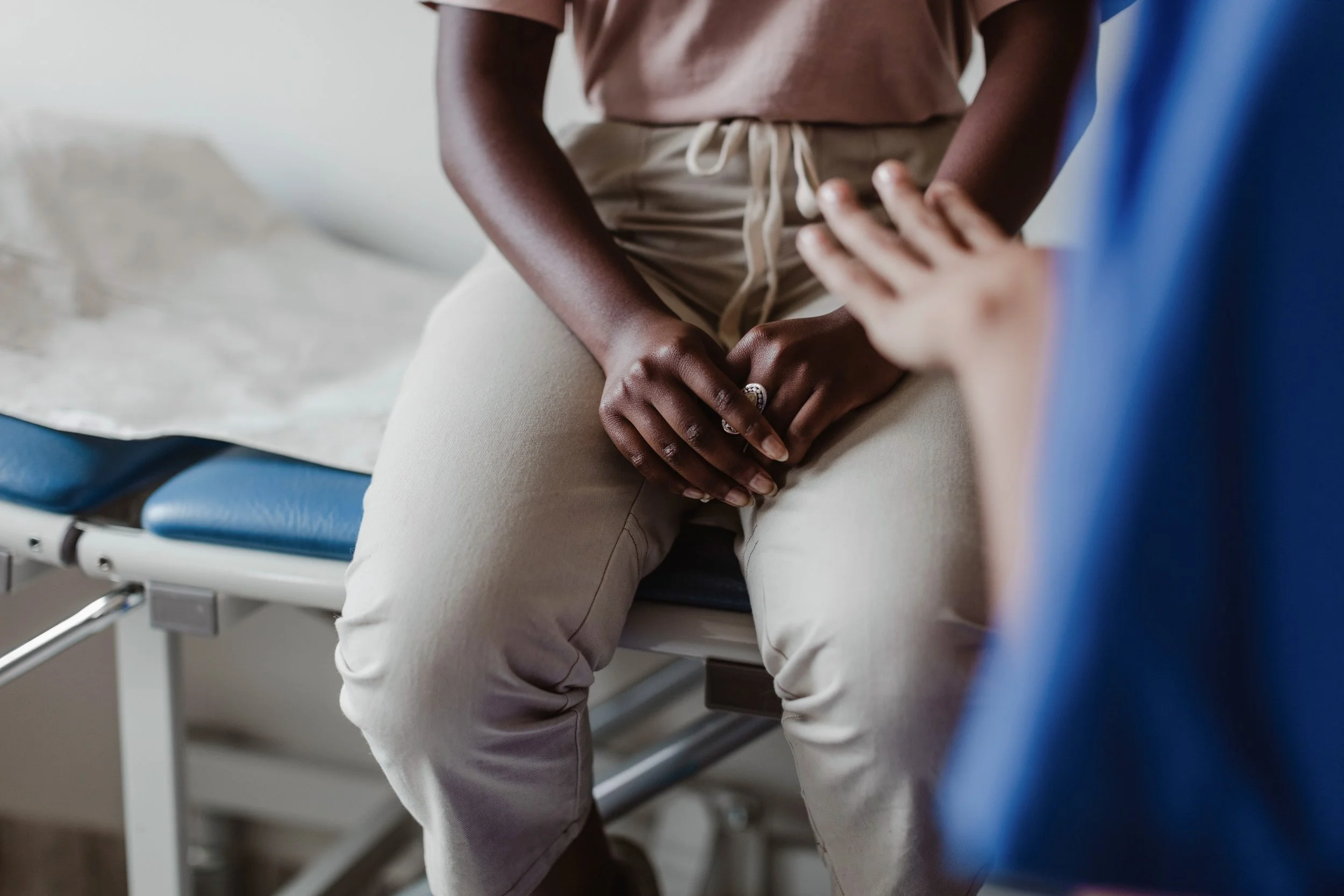The Horrifying Reality for Black People With Chronic Pain
Credit: Maskot via Getty Images.
By Anissa Durham
The health care system has a long history of dismissing Black people experiencing pain. Here’s what needs to change.
They say we have thicker skin. They say we have a higher pain tolerance. They say we don’t experience pain. And yet, we probably experience more pain than most.
Health care providers, physicians, and nurses are regularly complicit in dismissing the pain concerns of Black folks. In a 2016 study, nearly 50% of white physicians were more likely to underestimate the pain of Black patients.
From J. Marion Sims’ experiments on enslaved women and children in the 19th century to the Tuskegee syphilis experiment and the theft of Henrietta Lacks’ cells in the 20th century, the United States has a long, troubled history of unethical experimentation on Black bodies, dehumanization, and the spread of disinformation targeting the Black community. So, it’s unsurprising that many Black folks harbor mistrust toward physicians and the health care system.
And unfortunately, not much has changed.
The indignity of having one’s pain dismissed because of skin color remains an all-too-common experience for Black patients in the 21st century.
Whether it’s a chronic illness, a one-time emergency, or battling a disease, the health care experiences Black people have been well documented — with many forced to self-advocate. In a 2022 Pew Research Center report, worse health outcomes for Black people were regularly attributed to less access to quality medical care and health care provides being less likely to give advanced medical care.
To put the issue of radicalized pain bias in the spotlight — and spark solutions — the Advil Pain Equity project partnered with Morehouse School of Medicine and BLKHLTH for a new survey of 2,000 Black Americans about their experiences when seeking pain care and treatment. The study found 74% of respondents said there is bias in how pain is diagnosed and treated.
Word In Black spoke with four Black men and women about their experience with pain and treatment from health care providers. Here are their stories.
Mark Hayes, 42, Greensboro, North Carolina
Two weeks after getting diagnosed with COVID-19, I got a head cold that migrated down into my chest. In January 2021, I went to urgent care, where I tested negative for COVID-19 and the flu. They said it would pass.
As more time went on, I became weak and fatigued at the smallest task. I started to get pains in my chest, so I went back to urgent care. Nothing was found. As I got worse, I tried urgent care again. The doctor said she could see my breathing was labored and told me to go to the emergency room.
I went, and everything they tested for was negative. They sent me home again. My exhaustion worsened and the pains in my chest got stronger. I returned to the emergency room again. My undershirt, sweatshirt, and my coat were all soaked with sweat — which finally got the nurse to check my heart and request blood work.
Photo of Mark Hayes/ Courtesy of Advil.
I made a phone call to my son, telling him I loved him because I thought my time on earth was over.
In late April of 2021, they discovered pericarditis. It took four months to get this diagnosis. I got a cardiologist. A few months later, the process was on repeat.
On Oct. 10, 2021, symptoms appeared again. Trips back and forth to urgent care, I requested blood work, and they would not listen to me.
I’t was like I was in a crowd of people screaming for help, and no one could hear or even wanted to hear me.”
MARK HAYES
My cardiologist was out of the country, so I was passed to another one. I asked the on-call cardiologist for blood work, and he tried to dismiss me from his office. I begged him to take blood samples — he only did it to appease me.
Days passed, no one called with the results. I received an email with the test results, but it was just a ton of medical jargon. I called the doctor’s office; the nurse said the doctor put in his notes that it wasn’t pericarditis — and that the notes were from before he received my labs.
The doctor never called me.
On January 1, 2022, a physician’s assistant told me I had pericarditis for the second time.
I was treated as if I couldn’t possibly know what I was talking about. It was like I was in a crowd of people screaming for help, and no one could hear or even wanted to hear me. I felt like an experiment. I was treated with disrespect. As if I were intellectually inferior and didn’t know what I was feeling in my own body.
I am terrified of doing the things I once loved because I’m afraid the process will start all over. And the next time, I may not be lucky. My mental health suffered drastically. It just created fear and a lack of trust in the medical system because I felt like no one cared.
Diedra Rodriguez, 36, Irvington, New Jersey
Photo of Diedra Rodriguez/ Courtesy of Advil.
I had just given birth, when I started experiencing pain on Feb. 8, 2023 due to an undiagnosed heart attack. But my symptoms were dismissed, and I was discharged. Eight days later, on Feb 18., I called the paramedics. Then, I was taken to a different hospital where I was diagnosed and treated.
The first hospital made me feel as though I was being a nuisance for consistently complaining of pain. I was told that what I was feeling was normal, so I started to believe that I was overreacting.
It’s hard to trust doctors. I second-guess everything they say. I’m afraid that something may happen, and they won’t listen or believe me, and the next time will be the last time. My mental health has taken a huge hit. Anytime I’m in the doctor’s office, my anxiety is triggered, and I have panic attacks. Now, I am seeing a therapist. I take medication to cope with the trauma this experience has caused me.
Derek Walker, 60, Columbia, South Carolina
Photo of Derek Walker/ Courtesy of Advil.
I have suffered from migraines since I was a 11- or 12-years-old. It runs in my family. Around that age, I had a very bad one, so I went to the emergency room. Initially, the nurses took notes and asked questions about how I was feeling.
Then, the doctor came in, and told me that she did not believe men suffered from migraines. We had a bit of back and forth, before I threw up on her shoes. Amazingly, I was given a shot for my migraine after that.
Now, each time I enter a health care setting, it always has me on guard and ready to fight. I don’t assume that I’m going to have a smooth experience. Black folks are commonly dismissed because of decades of racist medical teaching that Black people have a higher threshold for pain. And the idea that Black people can’t be trusted to tell the truth — that we are lazy and will fake illnesses to avoid work.
Etisyai Pollard, 27, Florida
Since I started my menstrual cycles, in 2011, I’ve experienced excruciating pain. Everyone I spoke to, including my doctor, said periods were painful. It was just part of being a woman. I internalized this mindset, and this became the beginning of a very unstable relationship with my reproductive health.
My period lasted about nine days. After four cycles, the pain became unbearable. My mother is always in support of me speaking up. And she’s advocated for me with my primary care physician.
I was about 14-years-old the first time I went to a gynecologist — it was uncomfortable. She asked me a lot of questions about my sexual history and if I was on birth control. I was confused because I wasn’t sexually active, and that wasn’t the reason for my appointment.
RELATED: Black Children Deserve to be Children
The gynecologist asked if I needed birth control to avoid pregnancy. At this point, my mom and I were fed up. It felt like I was being profiled and pressured to admit to something that had no relation to my pain.
I wish that the entire process of finding and going to the doctors didn’t feel like war.
ETISYAI POLLARD
After sensing our agitation, she agreed that yes, a nine-day period was a bit excessive. I was given a one-time shot of Depo-Provera to shorten my period and was told it would resolve my pain completely.
What the doctor refrained from sharing was the grueling side effects. After the first shot, I had my cycle for 44 days. I was devastated. And my pain extended from abdominal cramps to increased heaviness and heightened back pain. It later shortened to 7 days, but I never went back for the recommended follow-up shot.
After my experience with that shot, I gave up on hormonal therapy. The next 10 years were an uphill battle of heavy, painful cycles, fainting spells, calling out of work, missing family events, ruined sheets and clothing, abandoning opportunities, and long nights of questioning my sanity.
Photo of Etisyai Pollard/ Courtesy of Advil.
I would often gaslight myself into thinking I was being weak. I know my experience as a Black woman ties heavily into this belief, as I never want to be seen as unreliable or lazy.
I have to work hard. I have to be strong. I am needed, and there’s no room to sit idly by or to rest. No one is coming to save us. Hyper-independence becomes the armor to shield us. It’s frowned upon to make excuses.
There was no room to give myself grace, even at my lowest. I was starting to get more and more sick, and by age 23, it was boiling over. I was becoming a shell of myself, trying to mask the pain and push forward.
No matter how much I had tried speaking up for myself to doctors over the years, I was met with the same reaction: This is normal. And the more I internalized this ideology, the more I suffered in silence.
This dangerous mentality almost killed me. I was rushed to emergency surgery on April 19, 2021, where I was diagnosed with stage 4 endometriosis. A 7-cm mass was removed. As a result of being neglected and years of suffering, I had my left ovary and fallopian tube removed due to excessive damage from the endometrium.
I wish that the entire process of finding and going to the doctors didn’t feel like war. There is a dire need for more patience, gentleness, and compassion across the board. I know it’s possible because they exist; it is happening, but it needs to be the majority, not a rare occurrence.





